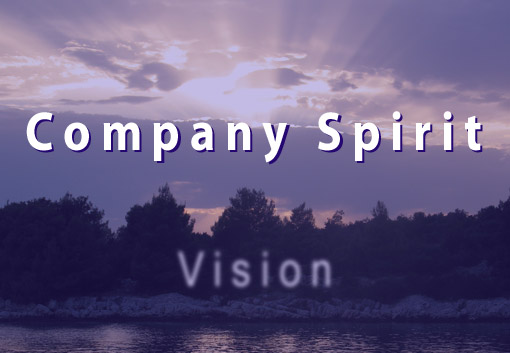Inside Out Leadership – Company Spirit first, then Vision & Values

When I’m talking to clients about the importance of knowing and articulating their company spirit or essence I frequently get the same initial response:
We do that already with our vision and values statement
Are the two things interchangeable?
Is your vision the same as your company spirit?
My response is usually another question: where do your vision and values come from? The answer is usually that the vision and values are chosen/debated – often out of a text book – based on the benefits that they believe their products or service offer.
Try and guess what company uses this vision statement:
By creating value for our customers, we create value for our shareholders. We use our expertise to create transport-related products and services of superior quality, safety and environmental care for demanding customers in selected segments. We work with energy, passion and respect for the individual.
How does reading that paragraph make you feel?
Are you inspired?
Compare it to this example from within the same sector:
———- will lead the way to the future of mobility, enriching lives around the world with the safest and most responsible ways of moving people. Through our commitment to quality, constant innovation and respect for the planet, we aim to exceed expectations and be rewarded with a smile. We will meet our challenging goals by engaging the talent and passion of people, who believe there is always a better way.
 With this example you get a strong feel for what the company represents, why they do what they do. There is a sense of the company spirit that lies behind everything they do.
With this example you get a strong feel for what the company represents, why they do what they do. There is a sense of the company spirit that lies behind everything they do.
The difference between the two is that the first one is an intellectual statement – a product of conscious understanding about what features and benefits the company believe they offer customers. The second example is more about experience, aspiration and intangible qualities like belief.
To understand and articulate the true spirit of your company you need to go beyond the limits of intellect and what you know, to sense and feel the powerful ‘thing’ that sits below and all around your company. What drives everyone in it to want to come to work everyday, what makes your customers want to return again and again, how do you describe that feeling that you get when you walk into one of your showrooms or factories and everything is just right.
Your company spirit is about you who you are – your essence. our vision is about where you are going,
How can you decide the second without knowing the first?
PS – the first vision is from Volvo and the 2nd is from Toyota

I believe that much of the reason for an organisation failing to achieve its vision is because it lacks a core spirit – or that that spirit and the organisation’s vision are incongruent with each other. It raises issues akin to companies possessing Freudian entities such as Ids, Egos and even super-Egos. This takes us back to the question of where does that spirit reside; in an individual, or a group i.e. the CEO or the whole Board? There are some clear examples where very strong CEOs have clearly defined the spirit and vision of organisations that they helmed e.g. Lee Iacocca, Jack Welsh, John F Kennedy and Steve Jobs in western society. In the far east, I think ‘spirit’ comes from the society’s own evolved norms and mores e.g. Chinese society still has Confucian principles such as: ritual norms, reciprocity, excellent character and loyalty to one’s nature embedded into its people. These sit at the core of the belief-set and influence thoughts and subsequent actions. More fundamental Taoist beliefs ‘Te’ – virtue (in capability and action) ‘Tzu Jan’ – naturalness, Wu-Wei – living with true nature i.e. no contrived action, have been left behind and are practiced in Taiwan mainly now. Do western boardrooms have anything like these collective spiritual concepts?
Hi Anwar, thanks for commenting. Do western boardrooms have anything like these collective spiritual concepts? In short, no, but that does not mean that western businesses don’t have a spirit or an essence; it means that they don’t take the time to define and articulate that spirit.
The point of this website and my work is to encourage leaders to delve deeper and realise the value of identifying the real company spirit – both to themselves as leaders and to the future success of their organisation.